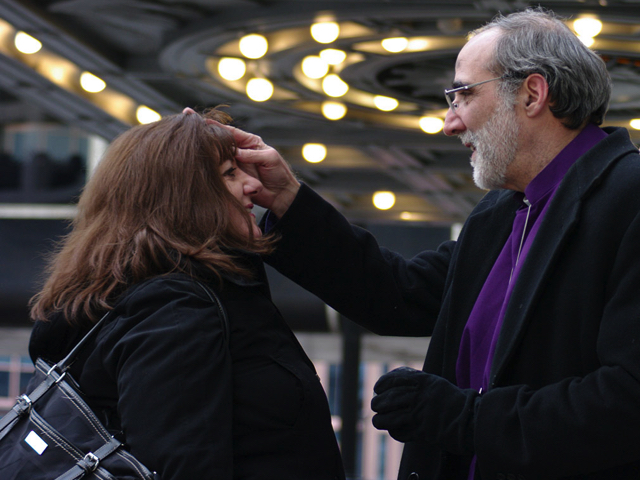
A traveler receives ashes from Bishop Mark Beckwith in 2014 |
Congregations across the Diocese of Newark will offer their communities a pastoral response to this tumultuous election season with an “Elect to Pray” campaign. On both Election Eve and Election Day, Episcopal churches in northern New Jersey will hold prayer vigils and worship services, or invite neighbors to come inside, light a candle for peace, and sit in quiet prayer or meditation.
The Rt. Rev. Mark Beckwith, Bishop of Newark, will lead an “Interfaith Service of Post-Election Reconciliation” from 12:30 to 1 p.m. Nov. 9, at which participants may express their hopes and concerns and commit to reconciliation. That service will meet at Trinity & St. Philip’s Cathedral, 608 Broad St. in Newark, at the north end of Military Park.
Bishop Beckwith began a post to his weblog on Nov. 2 by describing a friendly tussle he had in 1960 with a fourth-grade classmate:
[H]e was for Kennedy; I was for Nixon. We were laughing with each other as we wrestled, and in the course of the scrum the small telescope he was holding accidentally hit me on the forehead. We were both surprised at the sizable lump it created (it looked worse than it felt); and somehow we came to an immediate but unspoken realization that our friendship was more important than our difference, and we continued walking together.
Fifty-six years later, I yearn to see some play-fighting as we prepare to elect our next President, but I don’t think anyone has had any evidence of it. The insults, threats and accusations have been ugly and vicious. There is nothing playful about it. Hardly anyone is laughing. A winner will be declared in the wee hours of November 8, and while there may be some relief that the presidential sweepstakes is over, there will no doubt be lumps and scars to deal with. And the fear and anger — so viscerally present during the run-up to Election Day, may spill out in some nasty ways. The wounds will linger. It is hard to imagine, at least in some quarters, that people will realize that friendship — or at least mutual respect, will be more important than difference.
This is where the Christian faith, particularly as we live it out as Episcopalians, comes in.
We can start with the exchange of the Peace. Before it became a celebration of community (which is a pleasant and unintended consequence) the exchange of the Peace was intended as an act of reconciliation. Its roots are embedded in Matthew’s Gospel: “If you are offering your gift at the altar, and there remember that your brother has something against you, leave your gift there and go; first be reconciled to your brother, and then come and offer your gift” (Matthew 5: 23-24).
The exchange of the Peace is a visible witness to the commitment we make as Christians, that whatever has separated us can be brought back together in the reconciling love of Christ. The exchange of the Peace doesn’t smooth over difference (thank God, because we need to honor our difference), but it can heal division. And since we can’t presume that people in congregations vote the same way, there may be some painful divisions in our church communities, rendered more stark by the cruel cacophony that we can’t seem to escape. So make peace with one another. Especially make peace with the person you don’t want to make peace with. It may not cure the rift, but it will help heal it. The ritual of the Peace has the capacity to take us to places our psyches may not yet be ready to go.









